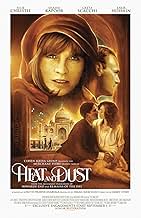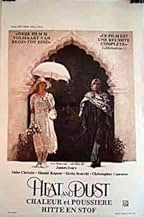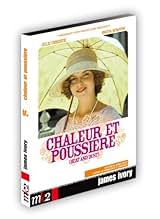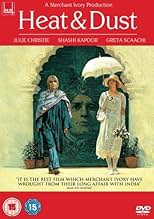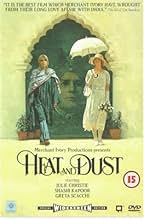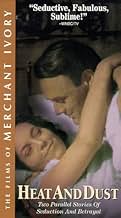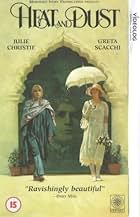Anne is investigating the life of her grand-aunt Olivia, whose destiny has always been shrouded with scandal. As Anne delves into the history of her grand-aunt, she is led to reconsider her ... Read allAnne is investigating the life of her grand-aunt Olivia, whose destiny has always been shrouded with scandal. As Anne delves into the history of her grand-aunt, she is led to reconsider her own life.Anne is investigating the life of her grand-aunt Olivia, whose destiny has always been shrouded with scandal. As Anne delves into the history of her grand-aunt, she is led to reconsider her own life.
- Won 1 BAFTA Award
- 2 wins & 8 nominations total
- Ritu, Inder Lal's wife (1982 in Satipur Town)
- (as Ratna Pathak)
- Maji
- (as Parveen Paul)
Storyline
Did you know
- TriviaProducer Ismail Merchant has said of the film's financing problems: "Halfway through the shooting, some of the finance committed to the project failed to materialize, and we found we were suddenly penniless. The cast and crew continued to work despite the fact that they weren't being paid, but that couldn't go on indefinitely. There was the strongest possibility that we would go under. We would lose not just the film but our whole company [Merchant Ivory Productions]". Renowned European banker Sir Jacob Rothschild viewed a rough cut of the unfinished film and in a rescue package acted as a completion guarantor so the picture could be completed.
- GoofsWhen Douglas gets on his horse near the 39 min mark, it appears to have the saddle on backwards.
- Quotes
Olivia, his wife (The Nineteen Twenties in the Civil Lines at Satipur): You have these set notions about what English women are supposed to stand. Why should anybody tell me what I can stand and what I can't stand? Well, if you want to know, the only thing I can't stand is English women. Memsahibs.
A similar device was used in another British film of this period, "The French Lieutenant's Woman", which also switched backwards and forwards between a story set in the past and one set in the present day. There is, however, a difference between the two films in that in "The French Lieutenant's Woman" the present-day story was an invention of the scriptwriters and was not found in John Fowles's original novel; it was inserted to provide a cinematic equivalent to Fowles's strong authorial voice and his famous two alternative endings. In "Heat and Dust" the modern scenes were an integral part of Ruth Prawer Jhabvala's book on which the film was based. Her aim seems to have been to compare contemporary attitudes to race and sex with those prevailing in the days of the Raj.
The trick of cross-cutting between two different stories with only a tangential connection between them can be a difficult one to bring off, in literature as well as in the cinema. Neither "The French Lieutenant's Woman" nor "Heat and Dust" works particularly well in this regard. In both cases the story set in the past is the stronger one, partly because it is filmed in a more sumptuous and visually memorable style, and partly because it is more fundamentally serious. We can empathise with Olivia because of the potentially tragic consequences of the course of action she is pursuing; the romance of Anne and Inder Lal seems trivial by comparison. (Inder Lal is cheating on his wife Ritu, but this fact tends to get overlooked).
The makers of "The French Lieutenant's Woman" (in my view the better of the two films) appear to have recognised this problem, because they devote much more attention to the Victorian romance of Charles and Sarah than they do to the contemporary one of Mike and Anna. They were also able to provide a semblance of unity to the film by using the same actors, Jeremy Irons and Meryl Streep, to play both sets of lovers. In "Heat and Dust", however, the cross-cutting can be confusing as we constantly move from one story to another. The parallels between the values of the seventies and those of the twenties, which were well brought out in Jhabvala's novel, tend to get lost here, even though she wrote the screenplay herself.
The other main weakness of "Heat and Dust" is that we never really understand why Olivia becomes entangled with the Nawab. This is no tale of an Anna Karenina or an Emma Bovary, married to a dull older man who neglects her and whom she does not love. Olivia's husband Douglas is young, good-looking and attentive; at the start of the film, indeed, she seems desperately in love with him, preferring to stay with him during the summer heat rather than follow the other memsahibs to the cool of the hill station where they spend the summer away from their husbands. Shashi Kapoor's oily Nawab, by contrast, is an obvious scoundrel, despite the dubious glamour conferred by his royal status. (The British suspect him of being in league with a gang of bandits, allowing them to operate with impunity in exchange for a share of their booty).
With this reservation, however, the story of Olivia is generally well done. The lovely Greta Scacchi, in her first major role, makes an appealing tragic heroine. (She was to play another adulterous colonial wife a few years later in "White Mischief"). The other parts are generally well played, and there is an amusing cameo from Nickolas Grace as Harry, the Nawab's effeminate but sinister British adviser. The look of this part of the film is attractive, made in Merchant Ivory's normal "heritage cinema" style. Interestingly enough for a film made by an Indian-born producer and an American-born director, its politics seem less concerned with post-colonial guilt than do those of many British productions about the Empire. Although some of the British are obviously racist, such as Patrick Godfrey's doctor, the administrators we see often seem more concerned for the welfare of the Indian population than do their own rulers such as the Nawab.
The modern story, however, seems like an intrusion into the much more interesting historical one. Julie Christie is normally a gifted actress, but she seems wasted here. There is some fitful humour provided by the character of Chid, the American convert to Hindu mysticism who seems more interested in cheap sex than he does in enlightenment. Otherwise this part of the film can arouse little interest. 6/10
- JamesHitchcock
- Nov 22, 2005
- Permalink
- How long is Heat and Dust?Powered by Alexa
Details
- Release date
- Country of origin
- Official sites
- Language
- Also known as
- Heat & Dust
- Filming locations
- Production company
- See more company credits at IMDbPro
Box office
- Gross US & Canada
- $1,761,291
- Opening weekend US & Canada
- $10,289
- Sep 3, 2017
- Gross worldwide
- $1,772,889
- Runtime2 hours 10 minutes
- Color
- Sound mix
- Aspect ratio
- 1.66 : 1
Contribute to this page



